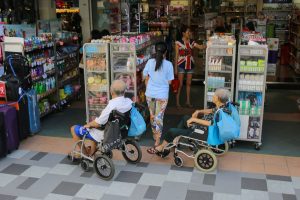Migrant domestic workers and the household division of intimate labour: reconfiguring eldercare relations in Singapore
October 1, 2022

The International Day of Older Persons is observed on October 1 each year. In 2018, the share of the population aged 65 years and older in Singapore matched that of those younger than 15 years, giving rise to the term ‘Silver Tsunami’, referring to the phenomenon of a rapidly ageing population. In conjunction with this, demands for eldercare labour have also escalated, with a ‘care deficit’ arising from low fertility levels, greater woman’s participation in the labour force, increasing life expectancies, and an ageing population. This has led to many families turning to non-familial caregivers to fulfil the responsibilities of eldercare, raising social anxieties about the decline of filial piety.
In ‘Migrant domestic workers and the household division of intimate labour: reconfiguring eldercare relations in Singapore’ (Gender, Place & Culture, 2021), Professor Brenda S. A. Yeoh (NUS Department of Geography & Asia Research Institute), Mr Liew Jian An (Asia Research Institute), Professor Elaine Lynn-Ee Ho (NUS Department of Geography), and Associate Professor Shirlena Huang (NUS Department of Geography) explain how families work through the market solutions and moral dilemmas of eldercare.
The term ‘intimate labour’ refers to work involving embodied interactions shaping the social reproduction of everyday life, such as shared secrets, interpersonal rituals, bodily information, awareness of personal vulnerability, and shared memory of embarrassing situations.
The work of ‘doing family’ and sustaining households requires the coordination of intimate labour, both paid and unpaid, performed by different members of the household. The delegation of intimate care labour to a domestic worker hence raises questions not only of a practical nature, but also emotionally laden concerns about who should care, and how care should be enacted. The significance of purchasing intimate labour to fill eldercare deficits thus goes beyond economic exchange, with it oftentimes introducing feelings of abandonment on the part of the elderly, fears of being supplanted on the part of familial caregivers, and frustrations with repetitive work on the part of paid intimate labourers.
The team derived their findings from in-depth interviews with 34 elderly persons ‘cared for’ by foreign domestic workers and 35 foreign domestic workers employed to ‘care for’ the elderly. Most households which employ foreign domestic workers for eldercare work assume a division of labour where every day repetitive intimate work tends to be shouldered by the foreign domestic worker, while sporadic or special acts of care likely to hold visible value in signifying family ties are retained in the performance of ‘family’. This underscores the fundamentally unequal relations between the employer (usually the son or daughter of the elderly charge) who is ‘family’ and the worker, a foreigner and cultural outsider, who is not.
Despite playing an enlarged role in sustaining social life in cities and regions with substantial care deficits, home-based eldercare performed by marginalised migrant others serves to rigidify the gendered contours of the ‘woman-carer model’ of care, facilitating the reproduction of the hegemonic family formation.
Read the article here.
